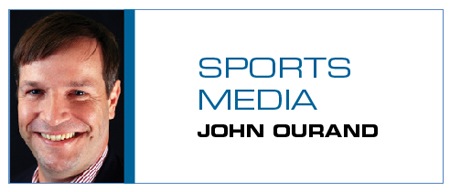The top three sports media topics that should be most closely followed at next week’s Cable Show in Chicago (June 14-16) are:
TV EVERYWHERE
When reporting this week’s story about the rising cost of sports rights (see Page 1), I was prepared for sports executives to say that more competition among TV channels is a main reason prices are going so high. It was also no surprise that executives would talk about higher ratings for live events — particularly sports — as another contributing factor.
What wasn’t expected, however, was that executives would bring up TV Everywhere as a reason for the increases. But almost every executive interviewed for the story cited the concept of being able to watch live sports from any device: linear TV, broadband or mobile.
The debate over whether TV Everywhere is the right concept for broadband and mobile video has ended. The TV Everywhere concept is coming. The idea that sports properties can sell linear TV rights on their own, without a digital component, seems archaic.
When asked to identify ESPN’s last linear, TV-only deal, ESPN’s Sean Bratches said: “It was well before the current management regime was in place.”
Not so long ago, cable operators viewed Internet video as a threat, especially as some broadcast and cable networks were making their programming available online. But TV Everywhere cuts cable operators into the action and protects the carriage fees networks like ESPN are getting. Because they have to be viewed live, sports are driving the TV Everywhere concept, allowing fans to watch games live on any device wherever they may be.
“People are realizing that in order to maintain the important revenues that come from traditional television distribution but still to capitalize on the new media opportunities and to service fans … a TV Everywhere solution makes a lot of sense,” said the NBA’s Bill Koenig.
THE OLYMPICS
The cable industry really doesn’t care how much the winning network pays for Olympic rights this week. Cable operators do care about who wins, though.
Since the mid-1990s, NBC has used Olympic rights to drive distribution and carriage fees for its cable networks. Every four years, cable operators would gripe about having to pay the “Olympic surcharges” that NBC would attach to its cable channels. It’s no coincidence that NBC now has four cable channels that are fully distributed, and those four cable channels have carried Olympic content in the past (USA, CNBC, MSNBC and Bravo).
If NBC wins the bid, what will happen to a channel like Versus, which has been stuck in around 75 million homes for the past year? What would the fact that golf is coming as an Olympic sport mean for Golf Channel, which is in 83 million homes? These are questions cable operators will be asking.
If Fox wins the bid, expect channels like Fuel (currently in 31 million homes) and Fox Soccer (39 million) to carry some of the Olympic action, which certainly will drive distribution of those channels.
An ESPN win could drive distribution for some of its cable channels, too. But ESPN would use Olympic programming to drive its TV Everywhere product, which has deals with Time Warner Cable, Bright House Networks and Verizon. It also will push for added distribution of its 3-D channel. Look at how ESPN used the FIFA World Cup to expand distribution of ESPN3 as a blueprint.
The winning bid should be announced about a week before the convention. I expect cable operator gripes to come shortly afterward.
TIME WARNER CABLE SPORTS
I expect David Rone to be one of the most sought after cable executives in Chicago next week. Last month, Rone was hired as president of TWC Sports, a newly created division within Time Warner Cable. His appointment is a sign that Time Warner Cable wants to be active in acquiring sports rights, like it did with the Los Angeles Lakers in February. Just how serious the MSO plans to be — and what model it plans to follow — are questions programmers and distributors alike will have for the former CAA Sports executive.
John Ourand can be reached at jourand@sportsbusinessjournal.com. Follow him on Twitter @Ourand_SBJ.




